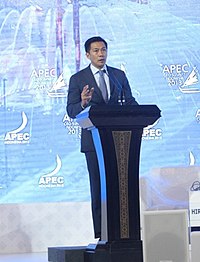
Photo from wikipedia
Abstract This research examines how shared leadership affects team performance over time. We argue that shared leadership, conceptualized and measured as team members’ network density of mutual leadership and influence,… Click to show full abstract
Abstract This research examines how shared leadership affects team performance over time. We argue that shared leadership, conceptualized and measured as team members’ network density of mutual leadership and influence, affects team performance because it enhances the team’s transactive memory system (TMS) – a system of distribution and retrieval of team members’ specialized knowledge. Based on a seven-wave longitudinal study, we developed a dynamic model to capture the mediation effect of TMS and the temporal effect of shared leadership and TMS on future team performance. With observations on the full life cycle of the teams participating in the project, we found that shared leadership had a positive effect on team performance and that TMS mediated this positive relationship. In addition, we found that the effect of shared leadership on team performance was stronger during the early stages of the team life cycle, and again TMS mediated this conditional effect.
Journal Title: Journal of Business Research
Year Published: 2021
Link to full text (if available)
Share on Social Media: Sign Up to like & get
recommendations!